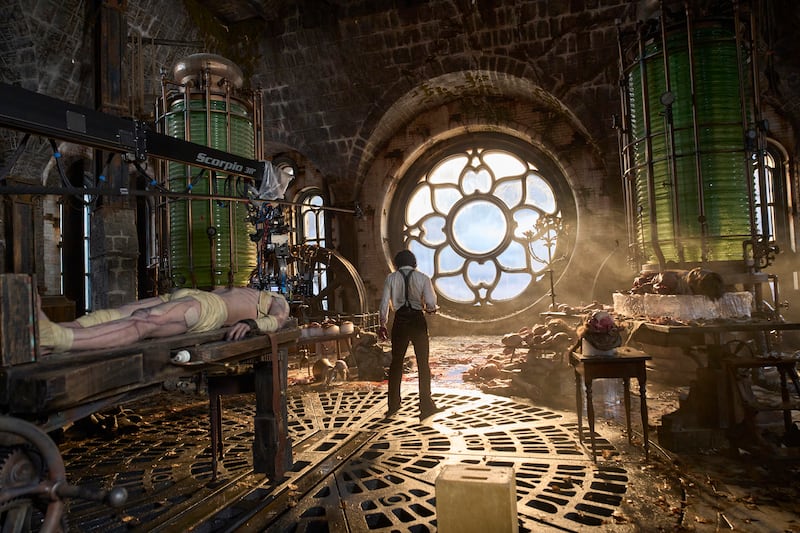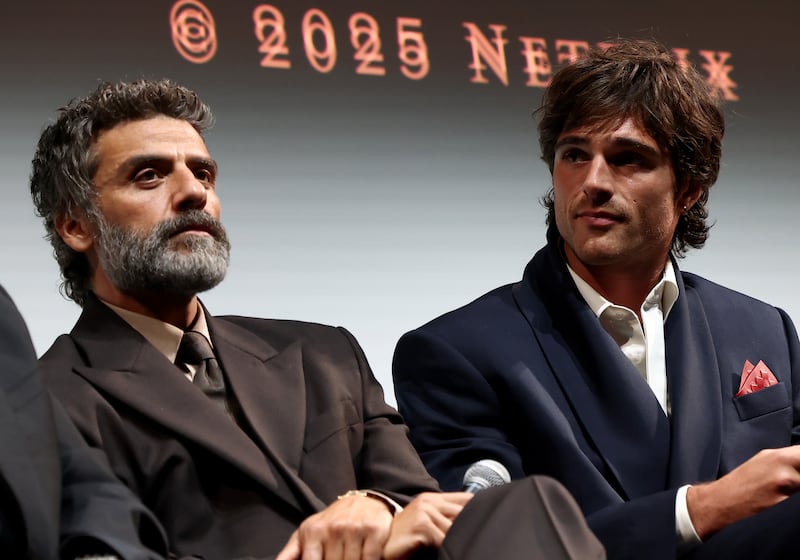After countless cinematic, television, and theatrical iterations, there was no discernible need for a new Frankenstein.
And yet Guillermo Del Toro more than justifies another adaptation of Mary Shelley’s 1818 classic with his gargantuan, grotesque, and grief-stricken opus.
A tortured saga of fathers and sons, hubris and humility, and enslavement and free will, the Oscar-winning filmmaker’s horror epic is as visually opulent as it is emotionally rich, a nightmare drenched in fury and sorrow. With an excellent Oscar Isaac as the fanatical doctor and an outstanding Jacob Elordi as his unholy handiwork, it’s a reimagining—screening at the Toronto International Film Festival—that’s thrillingly, monstrously alive.
Generally hewing to its source material while putting particular, heartfelt focus on the plight of its creature, Frankenstein commences with carnage, as Victor Frankenstein (Isaac) is found injured and alone in the Arctic by an expedition in search of the North Pole.
No sooner have they gotten him onto their ship (which has run aground on the ice) than the monster materializes, his face and body hidden by a tattered cloak that gives him the appearance of a marauding wraith, if not the Grim Reaper himself. Tearing through sailors whose rifles can’t stop him, the titan’s single-minded pursuit of his maker is only halted, temporarily, when he falls into the freezing water, thereby providing the mauled Victor with an opportunity to recount to Captain Anderson (Lars Mikkelsen) the origins of his present misfortune.
Following this prelude, Del Toro bifurcates his story between his two protagonists, beginning with the tormented childhood of Victor, whose surgeon father Leopold (Charles Dance) is a cruel tyrant who schools the boy (Christian Convery) in anatomy but cannot save his wife from perishing during childbirth.
This failure provides Victor with a terrible epiphany: the sole thing that truly matters is conquering death. As an adult, he attempts to prove to his contemporaries that he’s capable of this divine feat, and though they shun him, he convinces arms merchant Henrich Harlander (Christoph Waltz) to fund his endeavor.
Strengthening this partnership, Henrich’s niece Elizabeth Lavenza (Mia Goth) is engaged to Victor’s pragmatic brother William (Felix Kammerer). Elizabeth, however, soon falls under the ambitious tyro’s spell, and vice versa, muddying his efforts to reanimate a corpse stitched together from different men’s body parts.

Del Toro’s production design (courtesy of Tamara Deverell) is sinister and sumptuous, and his set pieces are shot and lit with exquisite ominousness.
For all its gruesome imagery and inflamed passions, Frankenstein never quite tips into outright madness; the proceedings’ restraint means that they’re less psychotic than stately. Even so, it’s a tremendously handsome film, and Isaac cuts a compelling figure as Victor, a zealous man whose rage and arrogance drive him to defy all conventions and cross all boundaries.
With wild hair that’s often covered by a wide-brimmed hat, his shirt partially unbuttoned and his eyes ablaze with obsession, Isaac’s scientist has crazed swashbuckling energy, and the star captures the way in which Victor’s modern-Prometheus dreams spring forth from the poison passed down from his paterfamilias.
Frankenstein is wet and grimy, searing and chilling, and it becomes truly charged once the creature comes to electrified life. Del Toro has great sympathy for his spawn of the devil, whom he envisions not as a groaning blockhead but, rather, as a lean, lithe, ferocious goliath with a clay-colored body of striking veins and patchwork divisions.
Victor is initially overwhelmed with love when the creature speaks his name and tenderly hugs him. His warmth, alas, quickly fades as the monster fails to mature as quickly as he desires; it’s not long before he’s referring to his laboratory offspring as “it” and berating and beating him for his apparent dim-wittedness.
It’s Elizabeth, delicately embodied by Goth, who helps kickstart the behemoth’s development from naïve child into conscious adult by showing him the compassion withheld by his father, who ultimately opts to erase his “mistake” by burning his creation and castle to the ground—a hellish conflagration that the creature narrowly escapes.

A feast for the senses, Frankenstein’s poignancy mounts once its attention shifts to the creature, who takes refuge in a farmhouse whose residents he covertly helps (earning him the nickname “the spirit of the forest”), and whose blind grandfather (David Bradley) treats him kindly and furthers his education by having him read the Bible and Milton’s Paradise Lost.
Elordi’s performance is the heart of this tragedy, casting the misbegotten creature as an innocent whose anguish over his abandonment begets a frightful anger that manifests itself in guttural howls and vicious violence against both men and beasts.
It’s an intensely soulful turn, equal parts menacing and melancholy, and it elevates the film’s second chapter, during which the monster, who is dead and therefore cannot die, decides that the only remedy for his loneliness is for Victor to once more play God and build him a female companion.
Diseased inheritances course through Frankenstein, and Del Toro locates beauty in blood and suffering, be it the elegant sight of Victor sawing and stitching together the creature’s appendages, or Elordi’s outcast fleeing through the misty woods as cawing crows soar by in kindred flight.
Narratively speaking, the director changes several aspects of Shelley’s original, including doing away with any mention of the creature’s fear of fire and lacing his conclusion with a dose of mercy. In his vision of this tale, Victor and the creature are corrupted by the sins of the father, and warped reflections of each other—a notion emphasized by Victor’s late loss of his leg, which renders him physically incomplete and forces him to use a prosthetic.
Still, regardless of his alterations, the auteur stays true to the novel’s fundamental outline and mournful spirit all the way to a finale in which death and life find some measure of harmony.
Like Nightmare Alley and Pinocchio, Del Toro’s Frankenstein bears his distinctive imprint but refrains from reinventing the wheel, making it less revelatory than simply robust. Nonetheless, Isaac and Elordi’s dynamic is wrought with agony and regret that’s even more compelling than the surrounding, lavish chaos and mayhem. And when it affixes its gaze upon its woeful hulk, it pulses with a passion and pain that marks it as its own beast.









